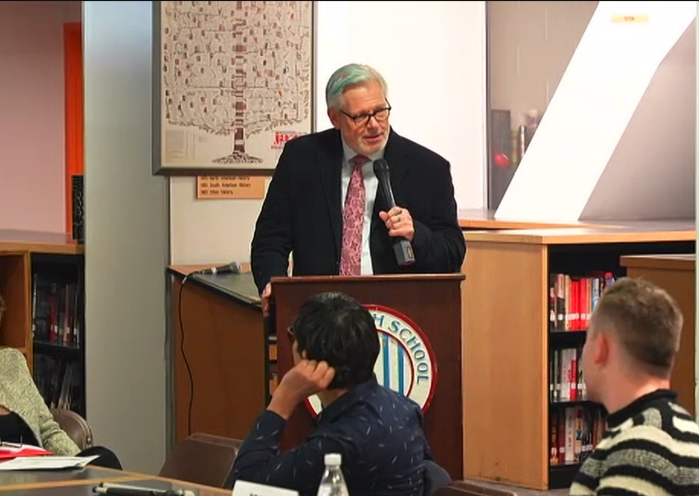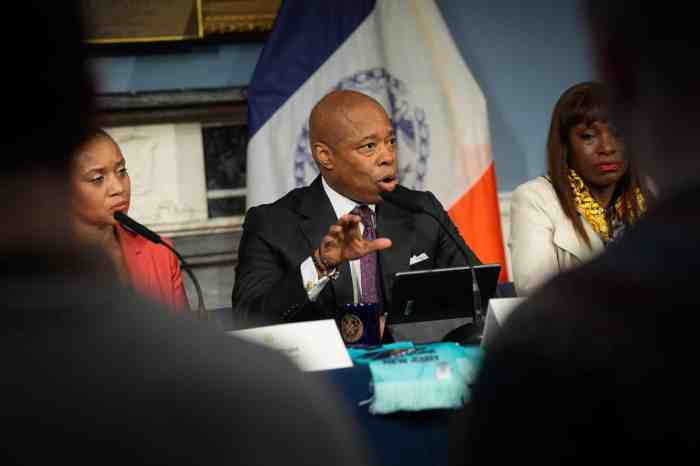Lucas hails Campbell Scott; remembering Wally Cox; Prozac at BAM
On June 28, the Film Society of Lincoln Center honored actor Campbell Scott with a mini-retrospective and the New York premiere of his newest film, “The Dying Gaul,” written and directed by Craig Lucas. Scott’s co-stars, Patricia Clarkson, who is his life partner, Peter Sarsgaard, Joan Allen, Alec and Stephen Baldwin and Mary Louise Parker all showed up at the genially informal affair.
“The Dying Gaul” was, to put it mildly, an interesting choice of film, featuring, as it does, a gay love affair between Hollywood industry-types Scott and Sarsgaard, with sex scenes that include a bizarrely noisy orgasm by Sarsgaard and Scott telling him, “I want to suck you until there’s not a drop left.”
Lucas gave a wacky, affectionate speech in which he extolled Scott’s bravery for coming aboard his pioneering AIDS film, “Longtime Companion,” in 1990.
“Nobody wanted to be in it,” Lucas recalled. “Everyone said, ‘Where are the stars and the African Americans?’ Denzel Washington turned us down. Campbell wanted to do it. His agent said, ‘Don’t do it. You wanna play a fag and start your career like this?’ Everybody else in that film did all the talking, but I wanted Campbell to be the witness. You would sense that somebody watching all the time would not be very interesting, but the mantra in the cutting room was always, ‘Cut to Campbell.’ What are we gonna do? That doesn’t work. There’s nothing in the scene. That guy is horrible. Why is she dressed like that? ‘Cut to Campbell.’ Every moment, you saw every thought in his eyes.”
Lucas went beyond recollections of “ Longtime Companion” in his praise of Campbell, lavishly so.
“I’ve probably seen every ‘Hamlet’ since World War II,” he continued. “Campbell’s is the finest of any English-speaking actor on the planet. I grew up listening to John Barrymore’s Hamlet but Campbell makes more sense of the part, gets more laughs and makes you sob at the end. If you notice, that was a Wisconsin accent in ‘Longtime Companion,’ about the hardest accent to do. It was subtle and made him a different person.”
Around the time of “Companion,” Lucas also gave Scott the script of his “The Secret Lives of Dentists” and Scott told him he was going to make that movie.
“He would call me once every six months and say, ‘We’re gonna make that picture,’ and god-damnit if he didn’t make it. It only took 14 years… and I just want to say here and now that I am not taking off this tux until I get my Tony.”
Sarsgaard simply described Scott’s acting as “more cow and less moo. A lot of us bitch and moan about the state of Hollywood. Campbell stopped that and created his own opportunities as an actor and, as a young actor, I really take that to heart.”
Scott was humorously modest.
“Patty [Clarkson] says, ‘The more you get honored, the meaner you get.’ She’s right, so before I get mean, I’ll try to be genuine for a second,” he said, going on to discuss the evening’s film selection and the roles he has played.
“What shocked me––and I know they chose the more well-known films––but there’s a bunch of comedies that would have been nice to see,” Campbell said. “God, it seemed like I only played the angriest people on earth, and then Craig spoke, and it seems like I just surround myself with angry people… but loving, angry people. It started that way”––with his parents, George C. Scott and Colleen Dewhurst––“and I guess it just continues.”
Marlon Brando had his entire tumultuous, triumphant and tragic life laid out for public viewing at the Christie’s auction of his personal effects on June 30. It was fascinating and highly instructive to wander through the rooms—a total Marlon Museum—and see the belongings of one of America’s greatest actors.
So utterly apparent in huge blowups of the youthfully succulent Stanley Kowalski and Marc Antony are Brando’s ability to have forever transformed America’s notion of male sexuality. Like Marlene Dietrich, who is permanently memorialized in Berlin’s Film Museum, Brando’s life was a complete, variegated reflection of the times in which he lived.
Unlike the recent Katharine Hepburn estate viewing at Sotheby’s, Brando’s and Dietrich’s lives were far more than an exclusive, sequestered existence in Turtle Bay, Beverly Hills and Connecticut, marked by a lifelong narcissism (all those bad Hepburn self-portraits) and lofty withdrawal from the hoi polloi. Brando’s early commitment to the civil rights movement (letters from the Rev. Martin Luther King, Jr. about his participation in the 1963 March on Washington, where he stood behind King as he delivered his “I Have a Dream” speech), the plight of Native Americans and other minorities and his interest in science and ecology were all evidenced in various artifacts auctioned off.
There was also intriguing evidence of his more androgynous side, including six pairs of women’s shoes (size 13 W), a capacious beaded evening gown and a DVD collection which included such all-time gay favorites as “All About Eve,” “Little Women” (Hepburn version), “Gentlemen Prefer Blondes” and, yes, “Mommie Dearest.” There were six large sketches of an unidentified, bespectacled gentleman whom I realized was Wally Cox, Brando’s onetime roommate and rumored lover, about whom Brando once said, “Not a day goes by when I don’t think of Wally Cox.” Brando kept Cox’s ashes in an urn on his mantle from the time of his death in the early ‘70s.
Brando, the eternal jokester, was also on display, with the belt inscribed to “The Mighty Moon Champion” from his “Godfather” crew, to honor his habit of humorously baring his ass. Photographs of him giving the finger to Anthony Quinn during a pool game, and to an unknowing Anna Magnani as he embraces her in “The Fugitive Kind” brought irresistible smiles. Johnny Depp describes how he once asked Brando why it is that farts are always funny. Brando’s answer: “Because they are blatantly anti-social.”
The big-ticket items in the sale did not disappoint. Brando’s personal “Godfather” script went for $312,800, a new world record. A letter from Mario Puzo, in which he cold-wrote the actor, with historic simplicity, “I wrote a book called ‘The Godfather’ which has had some success and I think you’re the only actor who can play the Godfather with that quiet force and irony the part requires,” sold for $132,000. A photo of Brando embracing a nude Rita Moreno fetched $48,000.
But it was also amazing to see how inexpensively some of the items went––in sharp contrast to the sales for the effects of Jacqueline Kennedy Onassis and Marilyn Monroe. A collection of Japanese woodcuts Brando owned fetched a mere $400.
On July 13, film critic/ programmer Elliott Stein is showing two fascinating, dance-related films, “Haunting Douglas,” and “The Cost of Living” at the Brooklyn Academy of Music. Directed by Leanne Pooley, the first deals with dancer/choreographer Douglas Wright, living with HIV. He was a star with Paul Taylor’s Dance Company in the 1980s and reveled in all that gay Manhattan had to offer,
He returned to his native New Zealand, where he makes powerful dances reflective of the intense rage he feels about ex-lovers, critics and his own rugby-mad, macho country. “Anger is not just mine,” he says. “Anger is like petrol. If somebody gets angry, someone nearby will catch fire. It’s about exploring the way energy can be transformed through art. I’m lucky, I’ve been given more than my share of anger so I’ve got a lot of it to transform.”
Stein, himself a New York treasure for his many years of perceptive criticism for The Village Voice and championing of queer/indie/obscure cinema, describes “The Cost of Living” as “a masterpiece, an opinion shared by The New York Times. It features the amazing, legless dancer, David Toole, and has a scene in a loo, or cottage, or whatever you want to call it, that should interest your readers.”
A product of the acclaimed British DV8 Dance Company, this half hour film was directed by Lloyd Newsom, and addresses what he calls “the Prozac of the art forms, dance,” and how frustrating it is for him and others who don’t fulfill the prescribed market value of what he perceives as all the dull, unoriginal prettiness that pervades the medium.
Contact David Noh at Inthenoh@aol.com.
gaycitynews.com

































